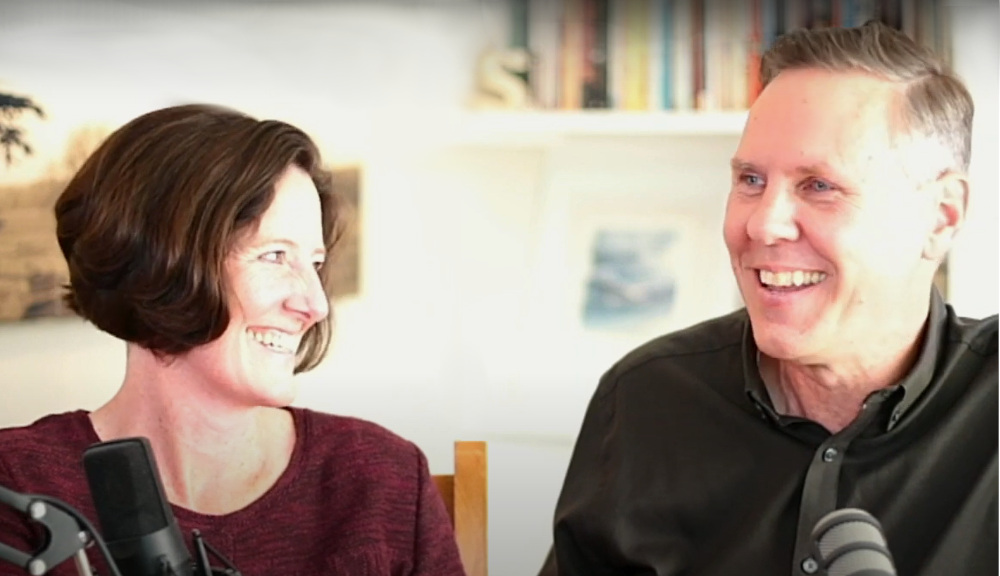Why You Should Keep a Journal (But NOT Every Day)
I have been journaling now for the better part of twenty years. It is one of the most important creative and spiritual tools I use. But when I ask others if they journal I often hear a common reply: ‘Oh I used to,’ they tell me, ‘but I couldn’t keep it up every day.’ It makes me want to cry. Somehow the idea has spread that the only way to journal is to do so as a daily discipline. People are relieved when I tell them that’s not the case. In this post and podcast I’ll share the impressive benefits of journaling, explore how you can get started, and hopefully destroy forever the belief that you have to do it every day. (Picture by Edward Peters CC BY-NC 2.0)
Listen Now
7 Great Reasons to Journal

There are as many types of journals as there are tasks in life. Work journals help you capture ideas and lessons learned (staff at the Dyson company keep journals of this kind. They’re left on site under lock and key to protect their secrets). Travel journals are fun ways to remember special places, and fitness journals can track your workouts and calories. But perhaps the best-known kind is the personal journal which is what I’ll focus on here. The benefits of keeping a personal journal are many:
- Journaling can help you get perspective. Writing your feelings and experiences down helps gets them out of your swirling, busy head so you can see them objectively. It can help you see connections you haven’t seen before, assess the significance of opportunities, and clarify goals.
- Journaling can help you clarify and solve problems. Exploring your problems on paper helps you transcend them. You can then brainstorm possible solutions, do pro-and-con lists, script scenarios and more.
- Journaling can help you process difficult emotions. Research attests to this. Writing about traumatic, stressful or emotional events can improve both physical and psychological health. It can help reduce anxiety and facilitate conflict resolution. No wonder there’s a Center for Journal Therapy now.
- Journaling can help nurture your creativity. Whether it’s brainstorming, doodling, mind mapping, story scripting, or just recording your best insights when they come, a journal can nurture new ideas and possibilities.
- Journaling can even help you write a book. I’ve shared how I use journaling to write books here. As well as my books, almost every article and devotional I write or talk I give starts first in my journal.
- Journaling can help you map the movements of your soul. As you record your questions, longings, joys, doubts and dreams over time, you can see when each arise, which reoccur, and more to track your inner life.
- Journaling can help you trace God’s involvement in your life. Unrecorded prayers are quickly forgotten. Written ones aren’t, and their answers or transformation over time is telling. More on that next.
5 Things to Write About

‘Great,’ you say. ‘But what do I write about?’ Over the years I’ve realised my journals explore five main themes. These may help you get started too, but don’t be limited by them. Your own themes may emerge over time.
Highs
You get a job offer from heaven. Your daughter is born. He proposes. God does a miracle. You’re not going to trust these moments to memory alone, are you? No! Record every detail and emotion that you’ll regret not having recorded in the future. Tape in the job clipping. Describe those tiny little fingernails. Recount how he nearly fell over getting the ring out of his pocket. Date the moment God answered the prayer. I record special experiences with God, good stories I come across, and life’s peak moments.
Lows
As already mentioned, getting sadness, stress, disappointment and other low moments on paper helps you transcend them. In truth, I have more Lows in my journals than Highs (something I should address), probably because I run so quickly to my journal when times are hard. That’s where I express my anger or hurt, write my prayers, explore the circumstances that have led up to these times. That’s where I meet God in my pain, pray the issue through, and (later) begin recycling these moments into redemptive lessons.
Questions
In places, my journals can resemble nothing more than notepads full of scrawled ideas. I have pages of potential book titles. I scribble notes and stories for my Radio 2 spots. I wrestle with my own and my readers’ theological questions. What does Jesus’ command to ‘turn the other cheek’ mean in light of terrorism? Why does God miraculously heal some and not others? When do you let a dream die? I work all these out in my journals because there can be gold in that wrestling, not just the answers you arrive at.
Discoveries
You have a conversation with a friend that yields an important insight. God speaks to you and changes how you see life. You finally understand what that cryptic Bible verse means. You find an answer to the questions you’ve been wrestling with. Please write these things down – if not for you, then for others. My last book Resilient came about by reading the Sermon on the Mount each day for months and journaling my discoveries.
Possibilities
Finally, your journal is the best place to dream. I have pages of book, film, radio and speaking ideas in my journals. Some are laughable. Some were quaint ideas at the time that didn’t go anywhere. Quite a few of them came true. As I’ve said before, one of the marks of a God-given dream is that it persists over time and a journal is a great place to test these aspirations out. Dream crazy dreams or just record interesting ideas, but write those possibilities down.
8 Tips to Get You Started

Ready to give journaling a try (or a second try)? Here are some tips:
- Keep it simple. Yes, you can buy lovely Moleskine or leather-bound journals and write with an 18th century fountain pen for inspiration. But in the end you want something you will use, not protect. I use affordable hardcover A5 notepads, either lined or blank page. I wish I could say I use a fountain pen, but I use whatever unromantic scribbling device is handy – it often has a hotel logo on it.
- Decide that your journal is for your eyes only. I can’t reinforce this enough. If there is the faintest thought that others will read what you’re writing you will start to self-edit. You won’t be truly honest with your feelings, temptations or doubts. You’ll start presenting your best self instead of the real one. You may choose to read an entry to someone, but no one sees the whole thing.
- Choose paper over screen. There’s no way you want your deepest questions, anxieties and confessions online, even in the most ‘secure’ of places (Wikileaks anyone?). Same goes for corruptible, hackable hard drives. Handwriting is good for creativity and memory anyway, so you win twice. And there are no distracting apps to tap on a piece of paper.
- Write freely and honestly. Since no one else is going to see it (read point 2 one more time) you can be completely honest and share all that’s on your heart. Vent, rage, cry, confess, ask, pray, ponder, dream. Only God is reading over your shoulder, and you can trust him with what you’re expressing.
- Write in code where necessary. Ok, so that inquisitive teenager in the house may love nothing more than to find and read your journal. It might be a good idea then to use a code system for certain sins, frustrations or other sensitive matters so you can write about your strange addiction to laundry detergent or obsession with Justin Bieber’s navel fluff with freedom. Using initials rather than names of those you’re angry with can also be good.
- Date each entry. It makes it easy to piece the experiences together later. When I’ve finished a notebook I then write the date ranges on the front cover.
- Get creative. Write, scribble, draw, doodle, paste, colour, staple, list, clip, rip, cut, splash, blot, and do whatever else in those pages you like. I’m a bit boring in this regard, but others are excellent at creating truly eclectic journals.
Write in a quiet, relaxed environment. Write anywhere. A quiet, relaxed environment is optimal but I’ve discovered that journaling can create a portal of solitude in the noisiest of places too.
And Forget About Frequency

Back to the ‘I tried to keep a journal but couldn’t keep it up’ thing. There is no one right way to journal! Write as little or as often in that thing as you need. I can go weeks without writing anything in my journal, then write every day for a fortnight. On average I’d write once or twice a week.
Is there value in journaling everyday? No doubt. But not if missing a few days leads you to give it up altogether. Your journal can be a confidante or a confessor, but it must never become your master. It is your servant, there when you need it. So go and enjoy it.






Allen Browne
Sheridan, thank you for sharing this encouraging and very constructive article.
Re-blogged at https://allenbrowneblog.wordpress.com/2016/05/26/do-you-journal/
Sheridan Voysey
Thanks so much Allen. And I’m hoping everyone will follow that link to your excellent ongoing series on Genesis
Louise Southwell
Thanks for sharing about Journaling Sheridan. I have always wanted to journal, you have inspired me to try 🙂 I may not comment but I always enjoy your posts!
Sheridan Voysey
Well thanks for commenting this time, Louise. And happy journaling!
Eddiepwns
This was such a great read, thank you for writing this article. You were extremely thorough in addressing questions and providing practical tips!
David Simons
I realise I am a few years late to the party, so to speak, but this post is the singularly most useful I have come across about journaling.
I have had so many false starts with journaling because I got into the mindset of having to write something every day. I have a sense of relief after reading this that I am ‘doing it right’ for me, journaling when I feel the need and have something worthwhile to write. Thank you.
Sheridan Voysey
So glad this was helpful, David. It’s our tool to use as best helps us, not the other way round!